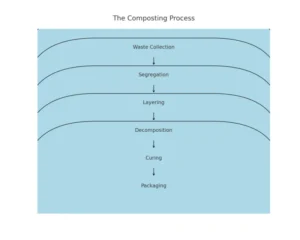The Business of Composting: Turning Organic Waste into Profit in Nigeria
We’ll explore the business of turning organic waste into profit through composting in Nigeria.
Composting has emerged as a sustainable and profitable business worldwide, and Nigeria is no exception. With growing concerns about waste management and the demand for organic fertilizers, composting offers a lucrative opportunity for entrepreneurs.
Not only does it address environmental issues, but it also creates wealth by converting organic waste into valuable compost for agriculture.
In this article, we’ll explore the business of composting in Nigeria, its immense potential, and how you can start your own composting venture.
Let’s dig into the details!
What is Composting?
Composting is the natural process of recycling organic materials, such as food scraps, leaves, and animal waste, into nutrient-rich soil conditioners. The resulting product, called compost, is a valuable organic fertilizer that improves soil fertility and structure.
Why is Composting Important?
- Environmental Benefits: Reduces landfill waste and greenhouse gas emissions.
- Economic Value: Generates income from organic waste.
- Agricultural Benefits: Enhances soil health, leading to higher crop yields.
The Composting Process
The composting process involves several steps to turn organic waste into valuable compost. Here’s a breakdown of the key stages:
 Flowchart displaying the Composting Process
Flowchart displaying the Composting Process1. Waste Collection
Organic waste is gathered from various sources, such as households, restaurants, markets, and farms. Ensuring a consistent and diverse supply of organic materials is crucial for effective composting.
2. Segregation
Collected waste is sorted to remove non-biodegradable materials like plastics and metals. This step ensures that only organic materials, such as food scraps, leaves, and manure, are used.
3. Layering
The segregated waste is arranged in layers, alternating between carbon-rich (browns) and nitrogen-rich (greens) materials. Proper layering ensures a balanced decomposition process.
4. Decomposition
The organic waste begins to break down through microbial activity. Regular turning of the compost pile introduces oxygen, which accelerates decomposition and prevents foul odours.
5. Curing
Once the active decomposition phase is complete, the compost is allowed to mature and stabilize. This curing phase ensures that the compost is safe and nutrient-rich.
6. Packaging
The finished compost is sieved to remove any large particles and then packaged for sale. Eco-friendly bags are often used to appeal to environmentally conscious customers.
Why Composting is a Profitable Business in Nigeria
1. Abundant Organic Waste
Nigeria generates millions of tons of organic waste annually, including food scraps, animal manure, and agricultural residues. Most of this waste ends up in landfills, presenting a massive opportunity for entrepreneurs to turn waste into profit.
2. Growing Demand for Organic Fertilizers
With increasing awareness of sustainable farming practices, Nigerian farmers are shifting from chemical fertilizers to organic alternatives. Compost is a cost-effective and eco-friendly solution.
3. Government Support
Policies promoting waste management and organic farming provide incentives for composting businesses.
Steps to Start a Composting Business in Nigeria
Step 1: Conduct Market Research
Understand the demand for compost in your area. Identify potential customers, such as farmers, landscapers, and gardening enthusiasts.
Step 2: Source Organic Waste
Establish partnerships with:
- Restaurants and markets for food waste.
- Livestock farms for animal manure.
- Agricultural processors for crop residues.
Step 3: Choose a Composting Method
- Aerobic Composting: Requires oxygen and is suitable for small-scale operations.
- Vermicomposting: Uses worms to break down organic waste and produce high-quality compost.
- Windrow Composting: Ideal for large-scale operations, involving long piles of organic materials.
Step 4: Set Up Your Facility
- Land: Secure a location with proper drainage and ventilation.
- Equipment: Invest in compost turners, sieves, and packaging machines.
- Storage: Create designated areas for raw materials and finished compost.
Step 5: Start Production
Layer organic waste in the composting area, maintaining the right balance of carbon and nitrogen. Regularly turn the piles to speed up decomposition and control odour.
Step 6: Package and Sell
Package the finished compost in eco-friendly bags and market it to your target customers. Highlight its benefits, such as improving soil fertility and being chemical-free.
Challenges in the Composting Business and How to Overcome Them
1. Collection of Organic Waste
- Challenge: Inconsistent supply of raw materials.
- Solution: Partner with multiple sources, such as local markets and farms, to ensure a steady supply.
2. Lack of Awareness
- Challenge: Limited knowledge of compost’s benefits among farmers.
- Solution: Conduct awareness campaigns and workshops to educate potential customers.
3. Initial Capital
- Challenge: High setup costs for equipment and facilities.
- Solution: Seek funding from government grants, microfinance institutions, or partnerships with NGOs focused on sustainability.
4. Odor Management
- Challenge: Unpleasant odors during decomposition.
- Solution: Use proper aeration techniques and carbon-rich materials like dried leaves to minimize odour.
FAQs
1. How much does it cost to start a composting business in Nigeria?
The cost varies depending on the scale of operation. Small-scale businesses may require as little as ₦500,000, while larger setups could need millions of naira.
2. What are the best organic materials for composting?
Materials like vegetable scraps, fruit peels, animal manure, dried leaves, and coffee grounds are excellent for composting.
3. How long does it take to produce compost?
The composting process typically takes 6 to 12 weeks, depending on the method used and the materials involved.
4. Can composting be done in urban areas?
Yes, small-scale composting can be done in urban areas using methods like bin composting or vermicomposting.
5. Is composting environmentally friendly?
Absolutely! Composting reduces landfill waste, lowers greenhouse gas emissions, and enriches soil health, making it an eco-friendly practice.
Conclusion
The composting business in Nigeria is a promising venture with significant environmental and economic benefits. By turning organic waste into a valuable product, entrepreneurs can contribute to sustainable development while earning substantial profits. With proper planning, the right resources, and an understanding of market needs, you can build a thriving composting business.
Ready to take the plunge? Start small, stay consistent, and watch your business grow—just like the plants your compost will nourish.
For more insights and tips on sustainable business opportunities, stay tuned to our blog!
